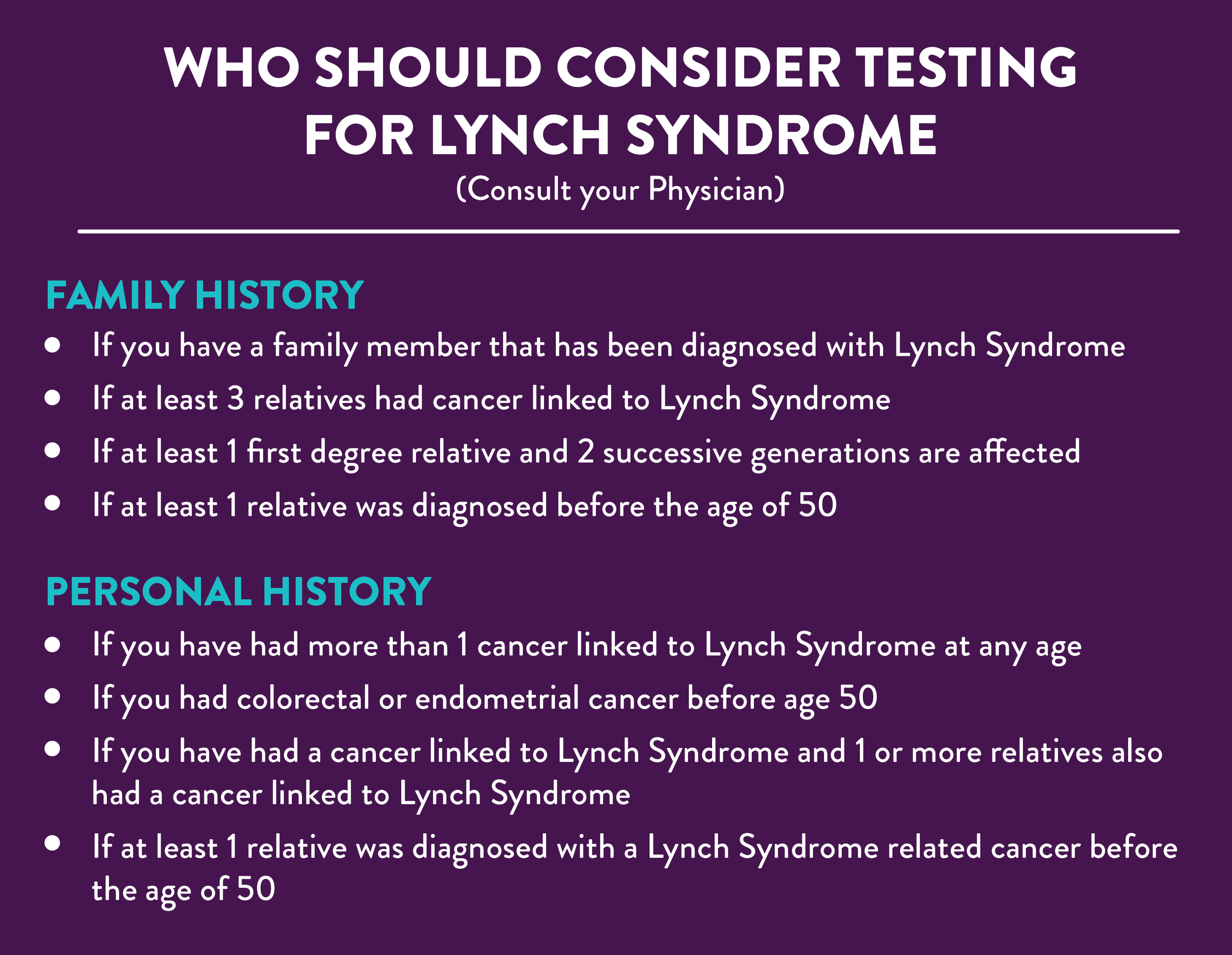GENETIC TESTING FOR LYNCH SYNDROME
HOW IS LYNCH SYNDROME DIAGNOSED?
Lynch syndrome can be confirmed through a genetic test using your blood or saliva. The test analyzes your DNA and can determine if someone carries a mutation that can be passed down (called heritable) in one of the five genes associated with Lynch syndrome. These five genes are: MLH1, MSH2, MSH6, PMS2, or EPCAM. Currently, testing is available for these genes. You can ask your doctor or a genetic counselor to order genetic testing for Lynch Syndrome. Genetic counselors can be found at findageneticcounselor.nsgc.org.
Sometimes, screening tests are performed on tumor (cancer) tissue to determine if Lynch Syndrome is likely. The 2 screening tests suggested are microsatellite instability testing (MSI) and immunohistochemistry testing (IHC). These tests do not diagnose Lynch Syndrome, but the results of these tests can indicate whether more specific genetic testing should be considered. Your doctor may still recommend genetic testing for Lynch Syndrome if you have a strong personal or family history of cancer, even if these screening tests are “normal.”
The American Society of Clinical Oncologists (ASCO) and the National Comprehensive Cancer Network (NCCN) now recommend performing a screening test on all colorectal and endometrial cancers diagnosed regardless of age. An abnormal screening test may prompt additional genetics testing via a blood test.
Some families also have Lynch Syndrome, but the underlying mutation cannot be identified in one of the 5 Lynch Syndrome genes. In these cases, you should speak with your doctor about how to individualize your cancer screening based on your personal and family history.
QUESTIONS YOU MAY HAVE ABOUT GETTING GENETIC TESTING
Are there any risks of getting tested for Lynch Syndrome?
The only physical risk is the same as getting a routine blood draw.
Genetic testing might be emotionally difficult. It is important to discuss genetic testing with your physician and a certified genetic counselor to discuss the benefits/risks of genetic testing.
Can my genetic information be used by insurance companies to deny me coverage or raise my premiums? Can an employer discriminate against me based on my genetic information?
The Genetic Information Nondiscrimination Act (GINA) is a federal law prohibiting health insurers and employers from discriminating based on your genetic information.
It is illegal for health insurers to request, require, or use your genetic information for eligibility for health insurance, premium costs, or coverage terms. In addition, your genetic information cannot be considered a pre-existing condition.
GINA prohibits employers from making decisions about hiring, firing, promotions, or pay; or to classify, mistreat, or segregate an employee based on your genetic information.
In addition, some states have additional protections. Other medical privacy laws such as HIPAA also apply to genetic tests that are part of your medical record.
There are some limitations to GINA. For example, supplemental insurance (such as life, disability, and long term care insurance) is not protected under GINA. GINA also does not apply to US military or federal government employees, or employers with fewer than 15 employees.
In many cases, the knowledge gained from genetic testing outweighs the risks of insurance discrimination. However, it is important to consider your specific situation before deciding to undergo genetic testing.
For more information go to www.ginahelp.org
Do insurance companies cover the cost of genetic testing?
You should check with your specific health insurance company and plan to determine coverage. Most health insurance companies cover the cost of genetic testing, and there are also self-pay or patient assistance options for those who do not have coverage.
The information provided on this website is not intended as medical advice. It should not be considered as a substitute for consulting with a physician or medical professional familiar with your personal health and medical needs.

